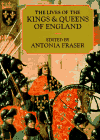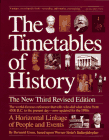Electric Roots Book Reviews
 Wilderness at Dawn: The Settling of the North American Continent by Ted Morgan Wilderness at Dawn: The Settling of the North American Continent by Ted Morgan
This has been one of my favorite books of the last year or so. Ted Morgan covers the history of the colonies in North America, from Jamestown through the Revolution. Morgan's style is unusual. Reading this book is more like reading a novel. Descriptive, almost gradiose prose takes some getting used to. But getting used to it is worthwhile. You will find real life heros and villians that you never studied in school. Sometimes inspiring, sometimes grotesque, but never dull, Wilderness at Dawn brings early American history to life.
 A New World : An Epic of Colonial America from the Founding of Jamestown to the Fall of Quebec by Arthur Quinn A New World : An Epic of Colonial America from the Founding of Jamestown to the Fall of Quebec by Arthur Quinn
Quinn really gets inside the heads of early America's major players. You will find explicit accounts of Native American cultures that you never heard in school. Some have called A New World a romantic history. This is true in the sense that Quinn depicts his history through the people who made it happen. His characterizations are not always flattering, but they definitely leave an impression. I literally read this book at the same time that I read Wilderness at Dawn, above. Both books brought our history to life in a way that I have never experienced before.
 Don't Know Much About History : Everything You Need to Know About American History but Never Learned by Kenneth C. Davis Don't Know Much About History : Everything You Need to Know About American History but Never Learned by Kenneth C. Davis
Okay, it's not real in-depth. But it's great for anyone who is just becoming interested in history and needs an entertaining and easy-to-read history primer. And I think it's full of surprises for history experts, too. My husband uses it for sermon illustrations, cause it's full of interesting little vignettes. Covers nearly all of American history.
 The Lives of the Kings & Queens of England by Antonia Fraser The Lives of the Kings & Queens of England by Antonia Fraser
I just ordered this book when I found that my Stafford line leads me back to King Edward III. While I try to determine the validity of these lines I thought I'd try to learn a little more about these potential ancestors. And whether you're related to them or not, this book is extremely helpful in understanding the politics and lifestyles of England during the past thousand years. Watch this page for my review when I finish the book.
 The Timetables of History : A Horizontal Linkage of People and Events by Bernard Grun The Timetables of History : A Horizontal Linkage of People and Events by Bernard Grun
Have you ever wondered what daily life was like for your ancestors of a certain period? This is a great resource. All it is is a huge book of timetables, from the 5000BC up to 1978. Every year is represented individually between 500AD and 1978, with comments on History and Politics, Literature, Theater, Religion, Philosophy, Learning, Visual Arts, Music, Science, Technology, Growth, and Daily Life. By combining all of these areas of history for each year, the authors give you a comprehensive picture of that year. I didn't realize that The Decline and Fall of the Roman Empire was written during the American Revolution to enlighten the British government on what to avoid in order to achieve world domination. Keep this book near your computer while you do your genealogy. You'll be surprised at how useful it will be.
 Generations: The History of America's Future, 1584 to 2069 by William Strauss and Neil Howe Generations: The History of America's Future, 1584 to 2069 by William Strauss and Neil Howe
Look at the title again. These guys look at history in a whole new way, and its a way that I found utterly fascinating. They contend that each generation in America has a certain collective personality, formed as a result of the generations before it. Thus a big repeating cycle. Sound bizarre? They make a pretty good case. Their theory explains why we were conservative in the Fifties, rioted in the Sixties, experienced moral decline in the Seventies, and why all of the generations living now think that young people are worthless. And they've given us a chance to prove them wrong by predicting our behavior during the next three generations into the future.
janib1@juno.com
|